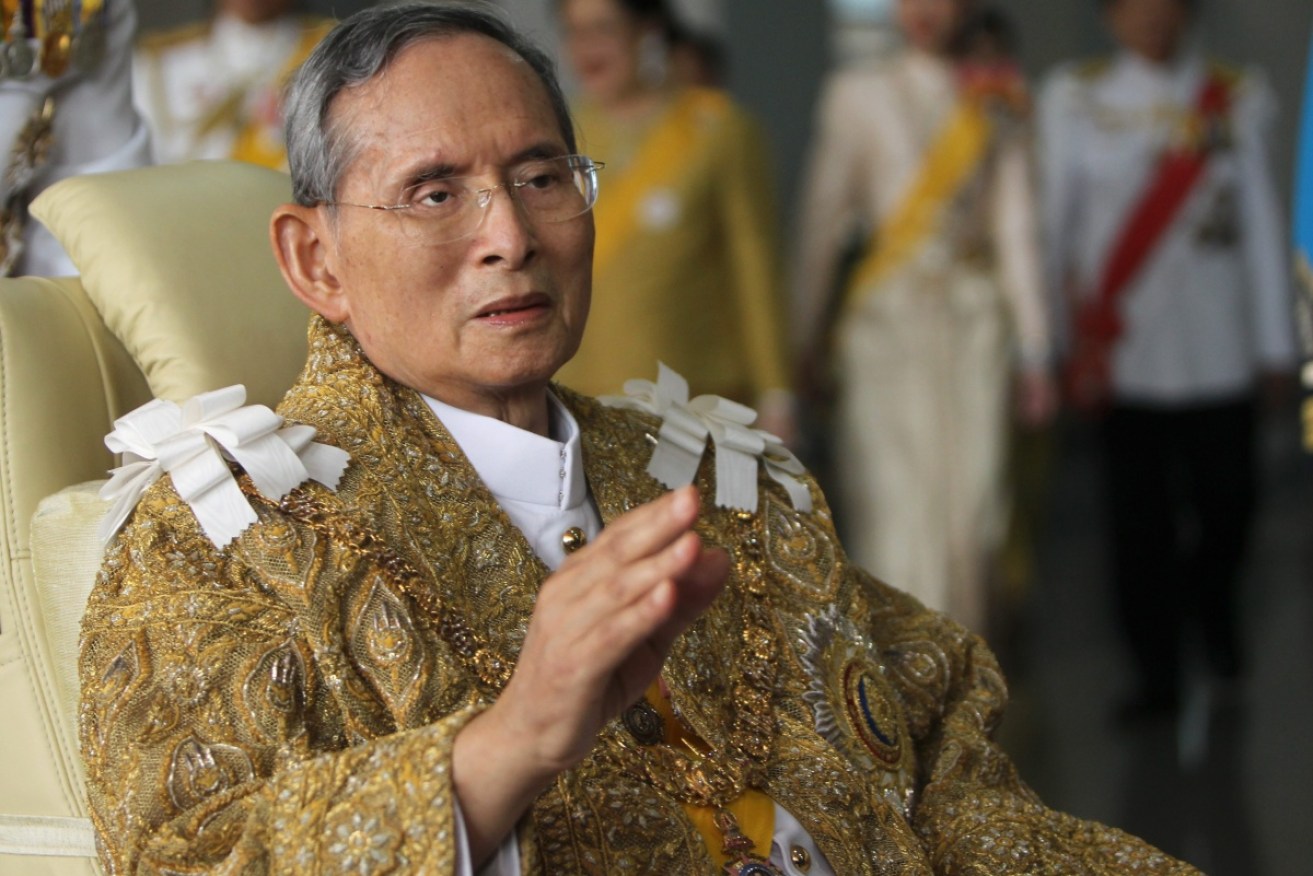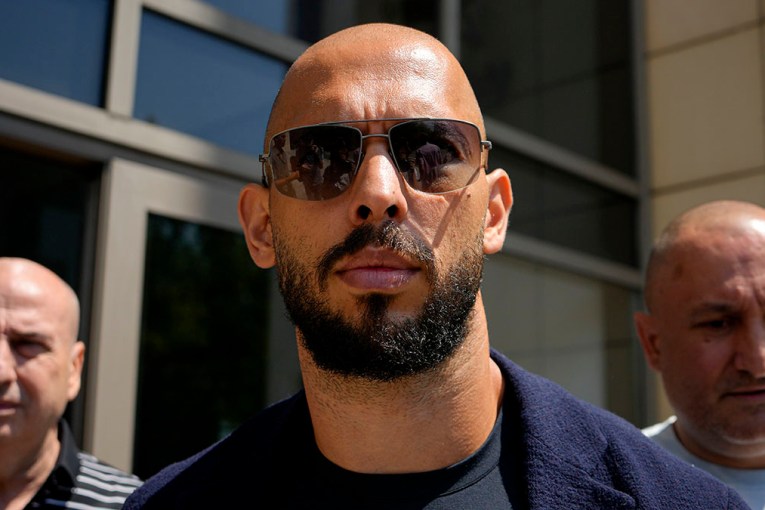Thai King Bhumibol dead at 88 after 70-year reign

Thailand's King Bhumibol Adulyadej pictured before his 83rd birthday. Photo: EPA
As a child, Bhumibol Adulyadej – who died on Thursday aged 88 – hardly expected to become king of Thailand.
His father was well down the line of succession and the family was living overseas. Bhumibol was born in the US in 1927 while his father studied at Harvard.
They returned to Thailand when he was barely two. But after the sudden death of his father from kidney failure in 1929, Prince Bhumibol’s mother took the family to live in Switzerland.
At the time, Prince Bhumibol’s uncle Prajadhipok was king. But a revolution in 1932 ended Thailand’s absolute monarchy and stripped Prajadhipok of most of his powers.
He abdicated in 1935 and fled into exile. Without an heir, the crown then went to Prince Bhumibol’s older brother Ananda Mahidol. Thailand was now a constitutional monarchy.
Prince Ananda was only nine when he took the throne and still living in Switzerland.
A series of regents ruled in his absence until he returned to Thailand after the war.
But in June 1946, he was found shot dead in his bedroom in Bangkok’s Grand Palace. His younger brother Prince Bhumibol became king at 18.
The exact cause of Ananda Mahidol’s death has never been resolved and remains a source of controversy.
Three servants were later executed for his murder. But in an interview years later with the BBC, King Bhumibol said the death remained a mystery.
“The investigation provided the fact that he died with a bullet wound in his forehead,” he said.
“It was proved that it was not an accident [and] not a suicide, but one doesn’t know.
“What happened is very mysterious because … immediately many of the evidence was just shifted … everyone was political. Even the police were political.”

A baby photo of Bhumibol Adulyadej (C) with his mother and siblings Ananda Mahidol (L) and Galyani Vadhana (R). Photo: Wikimedia Commons
The then Prince Bhumibol was at the palace at the time.
“When I arrived he was dead,” he said.
“Many people wanted to advance, not theories, but facts to clear up the affair. They were suppressed. And they were suppressed by influential people in this country, or in international politics.”
‘Hate at first sight’ turned to love for royal couple
The death of one king launched the reign of another.
King Bhumibol took the throne in June 1946, but returned to Switzerland to finish his studies.
In 1948 he crashed his car into a truck in Lausanne, and lost the sight of his right eye. On a trip to Paris he met his future wife Sirikit Kitiyakara, the daughter of Thailand’s Ambassador in France. Although the relationship did not begin smoothly.
“It was hate at first sight on my side,” she told the BBC.
“Because he said he would arrive at [4:00pm]. He arrived at 7:00pm, kept me standing there, practising curtsey and curtsey. So it was hate at first sight.”

Thai royalists light candles and sing anthems as they gather to celebrate the 87th birthday of King Bhumibol Adulyadej in 2014. Photo: EPA
But hate turned to love, and the pair married in Bangkok in April 1950, a week before King Bhumibol was crowned. Sirikit was made Queen.
It was the start too of a long love affair with the people of Thailand and beyond.
In 1960, they set off on a six-month world tour. The King and Queen were a stylish pair who loved to travel.
King Bhumibol was a jazz fan known as the “Swinging King of Siam”.
In her younger years, Queen Sirikit was voted one of the world’s 10 best-dressed women – she never wore the same dress twice on state occasions – according to the Australian Women’s Weekly in 1962.
That year they toured Australia for 19 days, taking in every state capital, and wowing new fans, including Australia’s then-prime minister Robert Menzies.
“The great pleasure, the great opportunity, for two or three days in Canberra, of having some of your own charm brushed off on us so that we might take it with us as a happy memory,” he said at the time.
Bhumibol ‘not born to be a king, has worked at it’

Thailand’s King Bhumibol Adulyadej and Queen Sirikit in 2005. Photo: AP
Virtually from the start of his reign, King Bhumibol was seen as a semi-god who embodied the values of Buddha. He was revered as a champion of the poor, and seen as a force for stability and unity in a country wracked by decades of tumultuous change.
Since 1932, Thailand has endured 20 coups d’etat, attempted coups, rebellions or other constitutional crises.
Through it all, King Bhumibol remained Thailand’s one constant, beloved by Thais for modernising the country’s monarchy and revitalising ancient traditions.
Perhaps because he was not born to be king, he had to earn the people’s respect.
“It’s not an inherited right,” Thailand’s former prime minister Anand Panyarachun said.
“It is not something that is given down to him by his father or grandfather. Because after all, he was not born to be a king you know. So he has worked at it, and he has been very successful.”
For 70 years, King Bhumibol maintained his people’s love and reverence.
Most Thais have never known life under another king. His face is on Thai banknotes and coins.
His portrait is in offices and schools across the country. Many Thais keep a photo of the king in their homes and cars.
The royal anthem is still played in cinemas before the start of a movie.
Reign not without controversy for devoted king
In return, King Bhumibol showed the same devotion to his people. His service often took the form of trips around Thailand, pursuing the cause of agriculture or other rural projects.
He won new respect in the early 1990s when yet another coup d’état led to deadly clashes between the military and pro-democracy activists.
As with other crises, he had the power to pull warring parties aside, read them the riot act and stop further bloodshed.
But his reign was not without controversy. In 2003, King Bhumibol supported a war on drugs which led to the deaths of 2000 suspects.
Human rights groups attacked the campaign for its state-sanctioned violence and called for a UN investigation. Such findings did little to diminish the way Thais felt about their king.

King Bhumibol and Prince Vajirlongkorn playing the saxophones. Photo: Getty
In 2006, on the 60th anniversary of him taking the throne – and the following year on his 80th birthday – they wore their hearts on their sleeves.
The mass of yellow shirts was inspired by the Thai colour for Monday — the day he was born. It soon became the symbol of royalist protests against then prime minister Thaksin Shinawatra and his red-shirted supporters.
When Mr Thaksin was ousted as Prime Minister in a 2006 military coup, many believed it had the king’s blessing.
Indeed, even the most recent coup — which reinstated military rule in May 2014 — was seen by many as a deliberate act to control the monarchy and the succession, not to mention the royal fortune, at a time when Thailand will likely face a power vacuum.
“It’s about who will be in power when the royal succession takes place,” Ernest Bower, senior adviser at the US Centre for Strategic and International Studies, said.
“It’s like a musical chairs game. When the music stops — when the king dies — whoever has power gets to organise the next steps,” he told CNBC News in the months after the coup.

People cry after learning the news. Photo: AP
The coup removed the last remnants of the government of Yingluck Shinawatra — the sister of the previously ousted Mr Thaksin — and seen by many as a proxy so her brother could govern from exile overseas.
One long-time Thailand observer, journalist Andrew Macgregor Marshall, wrote in the Australian Financial Review in 2014 that Mr Thaksin was seen as a threat to Thailand’s elite — the “royalist bureaucrats, tycoons and generals, who wield immense informal influence behind the scenes”.
“Thailand’s repeatedly rewritten constitution has specified that when the current king dies, his successor should be formally proclaimed by parliament,” he wrote.
“To have any chance of sabotaging the royal succession, Thailand’s old elite has to ensure it has control of parliament when Bhumibol’s reign comes to an end.”
Death leaves deep emptiness, uncertain future
King Bhumibol once nominated his only son, Vajiralongkorn as his heir-apparent.
But the crown prince lacks the popularity or respect of his father, and many Thais would prefer to see the king’s second daughter Sirindhorn — who some say most resembles the king — take the throne.
Marshall says Prince Vajiralongkorn has long been reviled by the royalist elite, who have dreaded the prospect of him becoming king. Yet he is seen as a close ally to Mr Thaksin.
“Thaksin allied himself with the crown prince, planning to play kingmaker when Bhumibol died,” Marshall wrote.

A Thai well-wisher weeps as she prays for the Thai King before his death. Photo: EPA
“A new elite seemed destined to supplant the old, with Thaksin and Vajiralongkorn set to secure political and financial supremacy thanks to the votes of the rural poor and the riches of the palace.”
The intricacies of this political intrigue can never be discussed in Thailand.
Debate over the monarchy is strictly taboo. Thailand has arguably the world’s harshest laws on “lese majeste”.
Under Thailand’s criminal code anyone found to have defamed, insulted or threatened a monarch or heir-apparent can be jailed for up to 15 years.
Many have fallen foul of the law, including Australians. Only the brave or foolish would dare discuss the royal succession even now, after the King’s death.
One thing is clear. Whoever becomes Thailand’s next monarch will inherit a fortune estimated to be worth between $30 and $40 billion, and regarded as the wealthiest royal budget in the world.
King Bhumibol spent most of the past two years in hospital for a series of ailments including heart trouble, irregular breathing and high blood pressure.
In recent years the King had made fewer and fewer public appearances or speeches, as his health deteriorated. He made a rare appearance at the royal palace on January 11, but he had not spoken in public for months.
The adoration of his subjects shows no sign of wavering, even after his death.
Tens of thousands of people are expected to turn out for his funeral. The official mourning period is likely to last several months.
His death leaves behind a deep emptiness and an uncertain future.
-ABC








